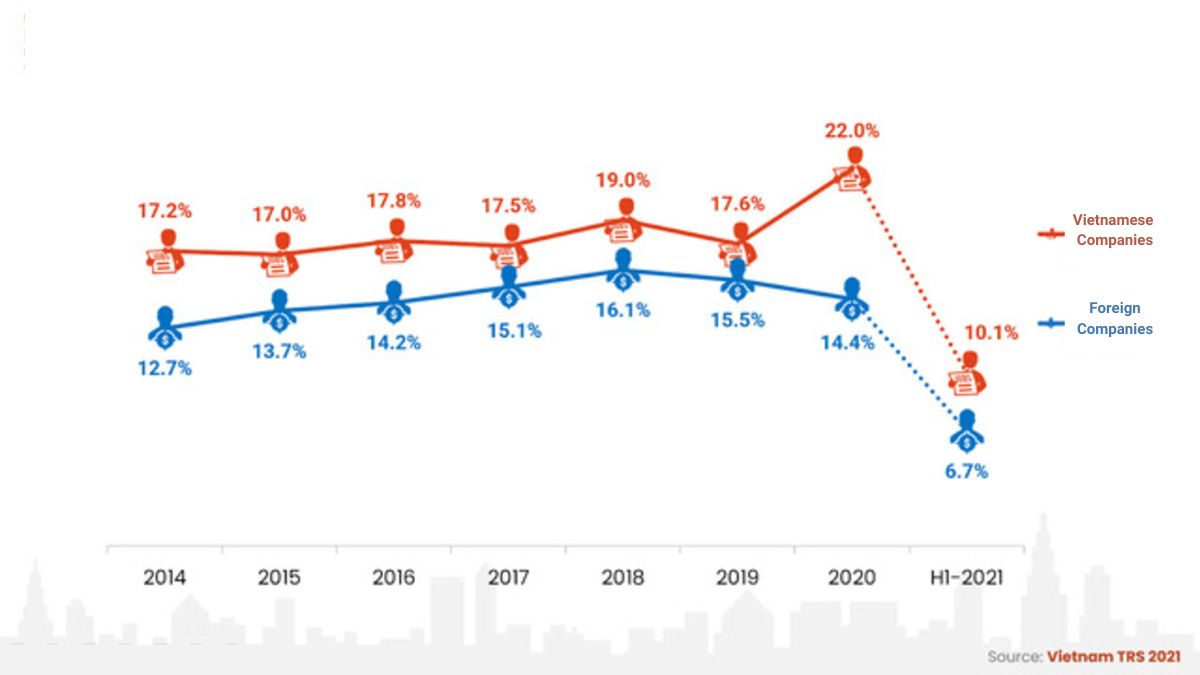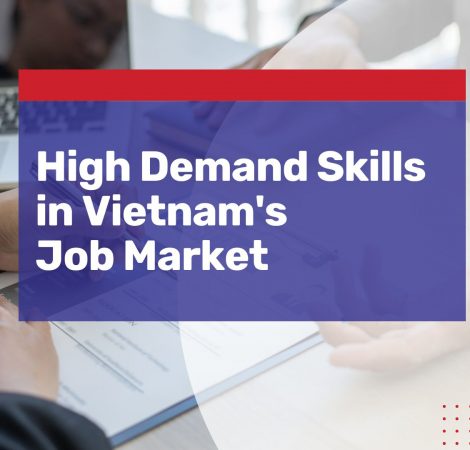With a bustling population of 100 million people, 51.6 million of whom belong to the capable labor force, and over half under the age of 35, Vietnam’s surprisingly young talent pool is the driving force behind the country’s resilient and sustainable economic growth.
However, such a large job market is not without its caveats. We’ve partnered with leading recruitment technology provider JobHopin to explore Vietnam’s current state of supply and demand in skills and talent.
Still wondering how to start recruiting Vietnamese employees for your business? Take a look at our Recruitment Outsourcing Service!
General status of the Vietnamese job market
According to the General Statistics Office, statutory working-age employed workers were estimated to be 45 million in numbers as of Q2 2022, up 2.3% year on year. JobHopin, however, recorded a staggering 38.6% increase in jobs listed on their platform.
Labor force by quarter 2020-2022
It’s safe to say that Vietnam is on the fast track to fully recover from the effects of COVID-19, with unemployment rates dropping by 34.9% from the last quarter, and people negatively impacted by the pandemic dropping by 52,7%.
Number and rate of working-age unemployed people by quarter, 2020-2022
High demand skills/industries
Experts state that if there were any keywords to describe the job market in 2021, they would be “blockchain” and “metaverse”. The year 2021 has seen a remarkable breakthrough in Blockchain and Metaverse. In 2022, this field is expected to grow rapidly. Observing the Vietnamese human resources market recently, we can see many Blockchain startups being founded and operated, accompanied by the “thirst” for skilled human resources.
The keyword “Blockchain programmer” alone has returned nearly 4 million search results. According to statistical data from JobHopin’s customers and partners, this is the position with the highest demand for talented people. Blockchain brings many completely new jobs such as Community Manager, Validator, Game Guild, etc. Most of the personnel in these positions do not have in-depth experience and need a lot of training and guidance to adapt. There is a big demand for human resources, but the supply is very limited.
Based on data from the latest market research, apart from blockchain, recruiters also showed increased interest in IT, retail (specifically e-commerce), and advertising. Meanwhile, popular and rising sectors among job seekers were IT, advertising, and financial services.
Skills currently in high demand in Vietnam
| IT | Advertising | Finance |
|---|---|---|
| Software Developer | Account management | Banking |
| Product Management | Marketing | Accountant |
| System | Planning | Finance |
| Java | Brand management | Auditing |
| Operations | Digital | Consultant |
Talent shortage
Speaking of the limited supply of talent, we also looked at some of the sectors where companies are having a hard time obtaining candidates with the right qualifications.
- Blockchain. As mentioned previously, the blockchain industry is the most intense playing field for recruiters in 2022. The CEO of JobHopin, Kevin Tung Nguyen, said that the talent supply only meets less than a quarter of the demand. Software developers and blockchain developers are the most recruited jobs in this space.
- Game development. Vietnam’s game enterprises ranked 7th most desirable in the world, and with some of them making big waves across the world as well as going public, workforce expansion becomes key.
- Business intelligence. As part of the digital transformation movement, data and analytics has also been forecast to face talent shortages throughout 2025. Data engineers and analysts are becoming increasingly valued as foreign companies also start to outsource to Vietnam in their digitization processes.
Additionally, other research has also listed marketing, construction, food technology, hospitality, and counseling psychology as high-demand careers in the upcoming years.
Challenges faced by recruiters/businesses
- Inadequate Employer Branding: Employers must take a proactive approach to attract and engage with top talent. A well-planned employer branding strategy can help influence businesses’ reputation as an employer among job seekers, employees, and key stakeholders. However, not many companies nowadays really pay attention and invest in employer branding.
- Lacking Market Insights: Market insights research helps businesses identify market trends, understand their core customers better, and set suitable goals. But in reality, the number of personnel for this industry is limited and has not been focused on by recruiters despite its high demand.
- Unclear Job Descriptions: Some businesses and employers still haven’t identified the specific requirements or essential skills they need from their potential employees, therefore, their job descriptions don’t appear to be transparent to candidates. Besides, factors such as the unclear scope of work or niche requirements also make it challenging for businesses to recruit qualified individuals.
- Impractical language requirements: Many businesses require advanced English level and certain certifications to prove the candidate’s English abilities. This can make it difficult for them to find the ideal candidate as some applicants may still have decent English skills and be qualified for the position but lack supporting documentation.
Technology and recruitment
Human resources and recruitment are also among the numerous industries reaping the benefits of technological advancements as of late. Technology in recruitment helps streamline the recruitment process, from screening resumes, and scheduling interviews to updating information and storing data, thereby saving the business time and effort. It also helps the recruitment process to be more efficient with both quality and quantity.
By taking advantage of new technologies such as AI/Deep learning, recruitment professionals can reduce paperwork and administrative burdens and focus on more critical tasks. Therefore, the application of technology helps to enhance the job quality of recruiters.
- Apply technology to Background Screening: By applying technology advancements, recruiters would be able to improve the quality and objectivity of recruitment, save time and fill positions faster, and enhance the candidate experience and employer brand.
- Use the support from recruitment consultants: Providing great support, recruitment consultants help companies save time and money on their recruitment process by identifying suitable talent, advertising opening roles, negotiating and interviewing candidates, and giving helpful industry insight.
RELATED: What to Know about Recruitment Technology in Vietnam
What are job seekers looking for in a listing?
Career Path: It is surprising to see that job seeker nowadays care more about their career development than their salary range. Top talents are now in search of a position where their leader or manager can map out their future growth and create realistic goals.
Working environment:
- Flexibility: After Covid-19, remote working seems to be the latest norm and people are leaning toward working flexibly. Being able to choose where to work and when to work became one of the benefits that job seekers are interested in.
- Personal recognition: While companies expect employees to contribute wholeheartedly to the company’s growth, job seekers need recognition for their hard work and a sense of appreciation for their effort.
- Learning opportunities: Job seekers also want to be able to learn while working, joining the more in-depth courses to enhance their work quality.
Avoiding high turnover rates
Voluntary turnover rate in Vietnam between local companies (orange) and foreign companies (blue) until H1 2021

As with companies worldwide, turnover rates in Vietnam have never been higher due to the pandemic. Furthermore, Vietnam is also known to be struggling with “brain drain”, where employees emigrate for better opportunities. Our talk with JobHopin’s representative also offered some insights into how the problem can be combated.
- Focus on employee engagement
- Create a win-win situation between employee and employer
- Recognize and invest in talented and competent staff
RELATED: Why It is Best to Outsource your Recruitment Process in Vietnam
About Us
Cekindo is a leading provider of global market entry services in South East Asia. We are part of InCorp group, a regional leader in corporate solutions, that encompasses 8 countries in Asia, headquartered in Singapore. With over 500 legal experts serving over 12,000 Corporate Clients across the region, our expertise speaks for itself. We provide transparent legal consulting, setup and advice based on local requirements to make your business perfectly fit into the market with healthy growth.
We help you hire suitable employees for your businesses, both Vietnamese and foreigners, and ensure everything is in compliance. Recruiting in a developing economy like Vietnam is not easy. Do it with a trustworthy business partner at your side.
Don’t take our word for it. Read some reviews from some of our clients.
